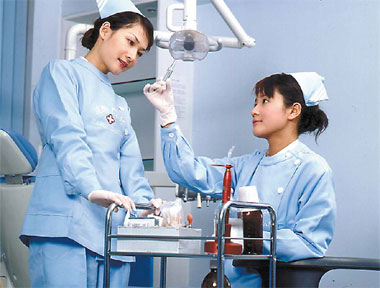


Liu Jia has been fighting an uphill battle since starting his dental business 14 years ago.
His privately held Jiamei Dental Medical Management Group has been competing in a market heavily regulated by the government and monopolized by State-owned hospitals.
Privately employed dentists provide only 15 percent of dental care nationwide, and even within the niche, competition is plagued by price wars and often poor service.
But that seemingly bad scenario offers a "perfect" and lucrative opportunity, according to Liu.
In China, "whatever industry is heavily regulated by the government is one of the most lucrative and promising," he says. "That means a higher threshold, which benefits first entrants like Jiamei."
The entrepreneur believes it is easier to build a strong brand image in a confused market than in an orderly one .
Beijing-headquartered Jiamei received a license from the government in June to become the first approved for a chain of private dental clinics in the country.
Chain businesses are heavily regulated in China, as fraud is rife, and the government tends to distrust private chains, particularly clinics.
But its new license now enables Jiamei to turn its 60 clinics across the country, with 37 in Beijing, into a true chain, which could give it an economy of scale. Another benefit is that when opening new branches the firm will not have the lengthy, stringent and often different application procedures for every city, as it had before.
It gives an edge to Jiamei's expansion plans and efforts to cash in on the growing demand for dental care in the country.
And the market is enormous.
Perhaps 560 million people out of China's 1.3 billion population have decayed teeth, estimates say, with 5-year-old children averaging four or five decayed teeth and senior citizens from 65 to 74 years old averaging nine to 10 lost teeth.
There are at least 2.5 billion decayed teeth in the country, 94.5 percent of which have not had any dental care, according to industry estimates.
As awareness grows, an increasing number of Chinese are now spending significant amounts of money on their teeth. Industry observers expect that dentists in China will eventually become among the nation's wealthiest professionals, as they are in the United States.
Dental care accounted for 6 percent of the 800 billion yuan spent on medical care in 2005, according to government statistics.
With those promising numbers, Jiamei secured a $10 million capital boost on August 6 from private equity firms Martin Currie Investment Management Ltd, based in Scotland, and Susquehanna Asia Investment Ltd. It marked the first venture capital investment in China's dental care sector.
Liu says he will use the money to acquire rivals and open new clinics, projecting that the number of Jiamei's outlets will hit 100 by the end of this year and 300 by 2008.
Dental clinics have mushroomed in recent years to more than 10,000 across the country. In Beijing alone there are nearly 2,000 and even in the much smaller city Qingdao, of Shandong Province, there are more than 1,000.
Yongkang Medical, one of Jiamei's rivals, also plans to expand, from 30 clinics to 200 within two years.
Both Yongkang and Jiamei are considering NASADQ listings to better finance expansion plans.
But as Yongkang was established just three years ago, less than the government's 10-year threshold, it appears the firm is unable to qualify for a license to run a chain business, which could slow its expansion.
Liu estimates that opening a new dental clinic in China costs from 1 to 1.5 million yuan, with costs about 20 percent higher to buy out a rival.
Jiamei is now in talks with several other venture capitalists and private equity firms for a second round of cash injection, which Liu expects will reach $40 million, to possibly be clinched at the end of this year.
Profiting in an unruly market
Running private clinics has been a tough business for many. In the 1990s, ads placed by them claiming to cure various diseases, especially venereal diseases, could be found on almost every street corner of cities in China.
Many private clinics were unlicensed, sold fake medicines and cheated patients of money, which made regulators wary. As a result, the whole industry was almost ruined.
"Regulators tend to restrict the expansion of private clinics due to a lack of trust," says Liu, adding that being the only licensed chain is a vote of confidence from the government
Under current regulations only clinics that have been in operation and free from medical accidents for at least 10 years are qualified to apply for a chain license .
Liu is confident when he looks at the competition - most dental clinics are small, established only in recent years and have been engaged in unruly competition.
He says that many use a dental amalgam that contains mercury for filling tooth cavities, which should be prohibited.
He contends the government license gives his firm a good chance to build strong brand awareness amid the rise of a middle class that is demanding more comfortable, secure and reliable services.
If Jiamei was competing in a mature market, it might have taken much longer to build the brand, he explains.
Some years ago, Liu invited his older sister to run two dental clinics under the brand name Jiarui, which sounds similar to Jiamei.
The two clinics went bust in less than a year due to low brand awareness.
"Many customers made calls to Jiamei, saying that Jiarui is taking advantage of the similar pronunciation to Jiamei to cheat patients," Liu says.
"In fact, the awareness of brands in the dental business has been on a steady rise," which makes it difficult for new entrants to establish a significant presence.
Jiamei now claims to have 200,000 loyal member patients.
(China Daily 08/13/2007 page6)













